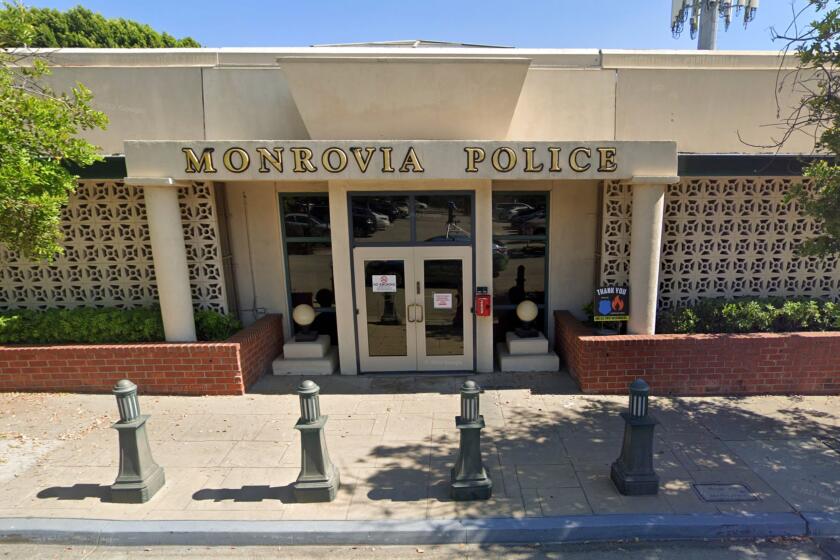2-Year-Old Mystery Persists as Man Denies Killing His Wife
As his wife’s strangled body lay unclaimed in a San Diego County morgue, Daniel Rodrick of Irvine began dismantling their life together. He bought a new bedroom mattress. He sold their car. Within weeks, he pawned her jewelry, sold her treasured antiques, took down her pictures. He moved.
It’s been two years since Carolyn Rodrick’s slaying. And although her husband has succeeded in shedding his past life with her, he admits he’s been less successful in shaking the suspicions that continue to swirl around him, doubts that have cost him relationships with family and friends and earned him a prominent defense attorney.
“I know I’m their main suspect; it’s me,” he said during a recent interview at his new home. “But that is because they have nothing. No evidence . . . nothing, which makes me their obvious choice.”
Rodrick, 39, though conceding that his marriage was not idyllic, insists he never harmed his wife. He said police have made his life miserable, insinuating his guilt to friends and family but doing little else to find the person responsible for his wife’s death.
“There’s no history of violence or fighting in 17 years,” he said of his marriage.
He told police his wife disappeared from the couple’s home in the middle of the night July 21, 1995. Hours later, her corpse was found alongside a desolate two-lane road in north San Diego County near Temecula but was not identified for 17 days.
The more than two weeks that Carolyn Rodrick, 35, spent in the morgue as a “Jane Doe” cost investigators valuable time. It was the result of a communications glitch that kept authorities from connecting the two cases sooner, a delay they said gave the killer a damaging head start.
Daniel Rodrick, citing the morgue mix-up, accuses police of conducting a shoddy investigation.
“Why did it take so long? What were they doing?” he asked. “This was just another body to them.”
In the 24 months since, detectives said they have been as baffled by the unsolved slaying as they are by Rodrick’s response to it. Particularly troubling, they say, is his refusal to allow them to talk to his 16-year-old son or 12-year-old daughter--who were at home the night their mother disappeared.
And although Rodrick said his defense attorney, James Riddet, calls police regularly on his behalf, detectives said they have yet to hear from either for an update on the case.
“Relatives do not typically give up on the murder of a loved one,” said Det. Rick Scully, who is handling the case for the San Diego County Sheriff’s Department. “It’s perplexing.”
Daniel Rodrick declined to be interviewed at length for this story; Riddet also declined comment.
On the anniversary of her death, Carolyn Rodrick’s friends and relatives said they hope someone will still come forward, someone with information he or she has kept secret or dismissed as insignificant, that could be the key to solving the slaying. The victim’s sister, Janet Vanzyl, said her family’s only comfort is knowing what “a paranoid life” the killer must be leading.
“It’s not enough, but it’s something for now,” said Vanzyl, speaking from her home in South Africa.
The Rodricks married young. She was 19 and called off the wedding at least once while the two were engaged. They married in front of a few relatives in South Africa in 1979 and two years later moved to the United States, settling in Irvine.
Their marriage was apparently tumultuous. They fought loudly and often. He accused her of infidelities. She responded with insults, often in front of their friends.
“She’d like to say stuff like, ‘Oh, be a man,’ which didn’t seem to help things,” said Jan Cleary, a former neighbor.
Added Vanzyl: “My sister . . . made up for her size with her mouth. No one will dispute that.”
Carolyn Rodrick was also free-spirited, once riding her Arabian gelding named Prancer by the drive-thru window of a fast-food restaurant. She was charming, and described by supervisors at the Great Western Bank in Newport Beach’s Fashion Island as bringing “fun to the workplace.”
When a cross-dresser came into the bank one day, friends recalled how she immediately struck up a conversation with him, chatting and laughing about men, women and relationships while he finished his transaction.
“She ended up giving him makeup tips,” recalled co-worker Mari Rennels.
Carolyn Rodrick adored her children and bragged about them often. Not long before her death, she spent the night in the hospital with her daughter, who had just had her tonsils removed.
“I am most proud of my kids,” she wrote in a work survey. “They set goals and reach them.”
But it was no secret that she was also unhappy. Friends said she often spoke of financial troubles and complained about her marriage.
In a note written to her mother a year before her death, she admitted that she and her husband were “never suited.” On flowered stationery, in girlish handwriting, she told her mother she had to fight the urge to “slap his face” every time she saw him.
“I do not see a way out. . . . I hate waking up and facing each day,” she wrote of their desperate financial situation.
To this day, friends said they never believed she would abandon her children, vanishing in the middle of the night without her house keys, a change of clothes, her purse and wallet.
“She was miserable, she conveyed that to us,” said Ginger Casey, another bank employee. “But none of us really expected she would leave those kids.”
Her body had rolled 20 feet down an embankment and joined the soggy garbage and rusted furniture more commonly left at the site--an illegal but thriving dumping ground.
She was petite and blond, dressed in jeans, white shoes and a black, long-sleeved shirt, wearing two silver rings. With no identification, she offered few clues to those who found her body, discarded “like a piece of trash,” Scully said.
That same day, Daniel Rodrick told Irvine police that he woke up and found his wife gone. He took the children to get doughnuts and dropped them off at school. Shortly after 9 a.m. he called the bank to ask about her.
Co-workers said they became alarmed and asked him to call police. He said he wanted to give her a little more time to show up, so a bank manager called police instead.
Officers were waiting for Daniel Rodrick when he returned that afternoon. He told police he suspected his wife had left him. He was able to identify what she might have been wearing by figuring out what was missing from her side of the walk-in closet, police said.
A sense of dread put Vanzyl, 41, on a plane to the United States within days of learning of her sister’s disappearance.
“I knew it wasn’t Carolyn to pick up and leave like that,” she said.
Many friends hoped Daniel Rodrick was right, that she left because things had gotten to be too much for her, and she needed a break.
“The alternative was just not good,” said Carol Montana, a family friend.
On Aug. 10, police brought Daniel Rodrick to the station and told him his wife’s body had been discovered. Irvine detectives searched Rodrick’s home but didn’t find much. By then, he had gotten rid of the mattress from the couple’s bed, their Mercedes-Benz and some of his wife’s personal belongings that authorities said could have provided valuable evidence.
“We had zip,” Det. Scully recalled.
Two years after his wife’s slaying, Rodrick has not been ruled out as a suspect, Scully said.
Rodrick said he only wants to go about raising his children. He bristled at the notion that his behavior has been unusual and said he is only doing what police told him to.
“They told me to get a lawyer and so I do, and now that’s suspicious,” he said. “I have nothing to hide, and I never have. I just want to move on with my life.”
More to Read
Start your day right
Sign up for Essential California for news, features and recommendations from the L.A. Times and beyond in your inbox six days a week.
You may occasionally receive promotional content from the Los Angeles Times.






